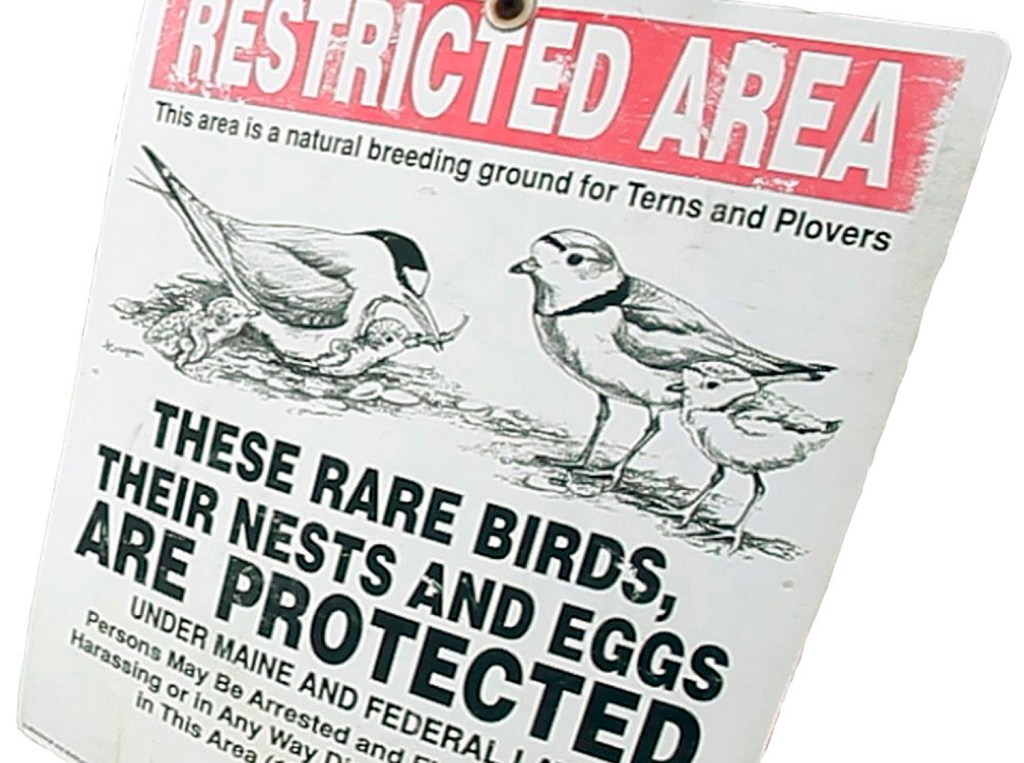The town of Scarborough has taken “meaningful” steps to protect piping plovers on its beaches, but improved signs and rules probably won’t prevent unleashed dogs from attacking the shorebirds and won’t insulate the town from future liability, a federal wildlife official said Tuesday.
The U.S. Fish and Wildlife Service informed Scarborough officials Monday that it will no longer pursue a $12,000 civil penalty threatened against the town after an unleashed dog killed a plover chick on Pine Point Beach in July 2013.
The agency applauded the town’s overall effort to increase plover protection, including better signs near nesting areas and a beach monitoring program that attracted 40 volunteers last summer. However, the agency warned it has “reservations” about a tougher animal control ordinance that still allows unleashed dogs on the town’s beaches at certain times during nesting season.
“They’re doing a lot of good stuff, but we can’t completely absolve them,” said Laury Zicari, the service’s field supervisor in Maine.
“Plovers don’t read the signs,” Zicari continued. “They go racing up and down the beach. And dogs are just being dogs. In theory, people are supposed to have their dogs under voice control. But the plover is an attractive nuisance. It’s hard for a curious dog not to chase one.”
And simply chasing a plover constitutes a violation of the federal Endangered Species Act, which prohibits actions that harass, harm or impair the feeding, breeding or sheltering of protected species, Zicari said.
Zicari met with Scarborough officials on Monday and delivered a letter notifying “the town and its residents of potential legal liability should off-leash dogs take another piping plover.” She suggested that the town apply for a special permit that would allow violations of the act under an approved mitigation plan.
Scarborough officials are glad that the federal agency has been satisfied by the town’s overall efforts, despite concerns about the dog-control regulations.
“I view this as closing the chapter,” said Town Manager Tom Hall.
Town officials are considering Zicari’s suggestion to apply for a special permit, but getting one won’t be “a short, simple or cheap endeavor,” Hall said.
Hall said he hopes Scarborough can partner with Old Orchard Beach and Saco – which share the 7-mile beach that stretches from Pine Point to Camp Ellis – and apply for a federal wildlife planning grant to finance the permit application.
Under an agreement reached in October 2013, the agency reduced the fine for the killed plover to $500 if the town adopted stronger regulations during nesting season, which runs from April 1 to Aug. 31. The town diverged from the agreement when it adopted a tougher ordinance last May that still allows unleashed dogs on beaches at certain times during nesting season.
From April 1 through Labor Day, dogs are either banned or required to be leashed within designated sections of Higgins, Ferry, Western and Pine Point beaches where piping plovers are nesting.
From May 15 to Labor Day, dogs are banned on all beaches from 9 a.m. to 5 p.m.; must be leashed from 5 to sunset; and may be unleashed but under voice control from sunrise to 9 a.m. During the remainder of the year, dogs are allowed in unrestricted areas during daylight hours but must be leashed from 1 to 3 p.m. Dogs are banned year round on all beaches from sunset to sunrise.
Last summer was productive for plovers across Maine’s beaches.
Wildlife biologists counted a record 50 plover pairs that produced 97 fledglings, Zicari said. That’s up from 44 pairs and 85 fledglings in 2013, and more than double the 24 pairs and 42 fledglings produced in 2008.
In Scarborough, nine plover pairs produced eight fledglings last summer, compared to six pairs that produced 10 fledglings in 2013 – the year one chick was killed by a dog – and four pairs that produced seven fledglings in 2008.
–––––––––––––––
CORRECTION: This story was updated at 2:21 p.m. on March 26 to clarify the town’s dog-control regulations on beaches.
Send questions/comments to the editors.


